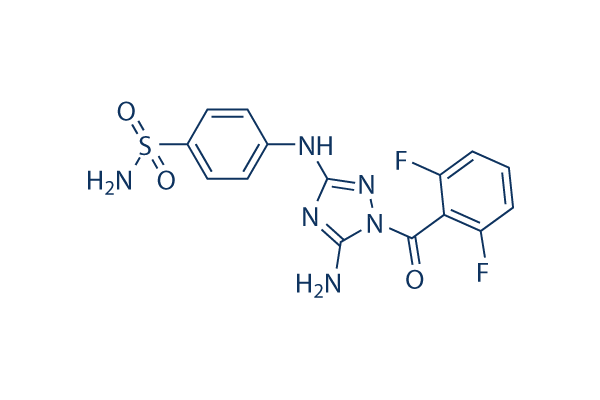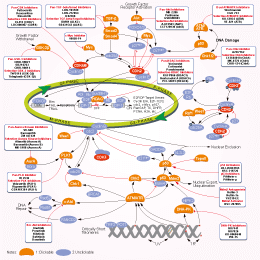
- Bioactive Compounds
- By Signaling Pathways
- PI3K/Akt/mTOR
- Epigenetics
- Methylation
- Immunology & Inflammation
- Protein Tyrosine Kinase
- Angiogenesis
- Apoptosis
- Autophagy
- ER stress & UPR
- JAK/STAT
- MAPK
- Cytoskeletal Signaling
- Cell Cycle
- TGF-beta/Smad
- DNA Damage/DNA Repair
- Compound Libraries
- Popular Compound Libraries
- Customize Library
- Clinical and FDA-approved Related
- Bioactive Compound Libraries
- Inhibitor Related
- Natural Product Related
- Metabolism Related
- Cell Death Related
- By Signaling Pathway
- By Disease
- Anti-infection and Antiviral Related
- Neuronal and Immunology Related
- Fragment and Covalent Related
- FDA-approved Drug Library
- FDA-approved & Passed Phase I Drug Library
- Preclinical/Clinical Compound Library
- Bioactive Compound Library-I
- Bioactive Compound Library-Ⅱ
- Kinase Inhibitor Library
- Express-Pick Library
- Natural Product Library
- Human Endogenous Metabolite Compound Library
- Alkaloid Compound LibraryNew
- Angiogenesis Related compound Library
- Anti-Aging Compound Library
- Anti-alzheimer Disease Compound Library
- Antibiotics compound Library
- Anti-cancer Compound Library
- Anti-cancer Compound Library-Ⅱ
- Anti-cancer Metabolism Compound Library
- Anti-Cardiovascular Disease Compound Library
- Anti-diabetic Compound Library
- Anti-infection Compound Library
- Antioxidant Compound Library
- Anti-parasitic Compound Library
- Antiviral Compound Library
- Apoptosis Compound Library
- Autophagy Compound Library
- Calcium Channel Blocker LibraryNew
- Cambridge Cancer Compound Library
- Carbohydrate Metabolism Compound LibraryNew
- Cell Cycle compound library
- CNS-Penetrant Compound Library
- Covalent Inhibitor Library
- Cytokine Inhibitor LibraryNew
- Cytoskeletal Signaling Pathway Compound Library
- DNA Damage/DNA Repair compound Library
- Drug-like Compound Library
- Endoplasmic Reticulum Stress Compound Library
- Epigenetics Compound Library
- Exosome Secretion Related Compound LibraryNew
- FDA-approved Anticancer Drug LibraryNew
- Ferroptosis Compound Library
- Flavonoid Compound Library
- Fragment Library
- Glutamine Metabolism Compound Library
- Glycolysis Compound Library
- GPCR Compound Library
- Gut Microbial Metabolite Library
- HIF-1 Signaling Pathway Compound Library
- Highly Selective Inhibitor Library
- Histone modification compound library
- HTS Library for Drug Discovery
- Human Hormone Related Compound LibraryNew
- Human Transcription Factor Compound LibraryNew
- Immunology/Inflammation Compound Library
- Inhibitor Library
- Ion Channel Ligand Library
- JAK/STAT compound library
- Lipid Metabolism Compound LibraryNew
- Macrocyclic Compound Library
- MAPK Inhibitor Library
- Medicine Food Homology Compound Library
- Metabolism Compound Library
- Methylation Compound Library
- Mouse Metabolite Compound LibraryNew
- Natural Organic Compound Library
- Neuronal Signaling Compound Library
- NF-κB Signaling Compound Library
- Nucleoside Analogue Library
- Obesity Compound Library
- Oxidative Stress Compound LibraryNew
- Plant Extract Library
- Phenotypic Screening Library
- PI3K/Akt Inhibitor Library
- Protease Inhibitor Library
- Protein-protein Interaction Inhibitor Library
- Pyroptosis Compound Library
- Small Molecule Immuno-Oncology Compound Library
- Mitochondria-Targeted Compound LibraryNew
- Stem Cell Differentiation Compound LibraryNew
- Stem Cell Signaling Compound Library
- Natural Phenol Compound LibraryNew
- Natural Terpenoid Compound LibraryNew
- TGF-beta/Smad compound library
- Traditional Chinese Medicine Library
- Tyrosine Kinase Inhibitor Library
- Ubiquitination Compound Library
-
Cherry Picking
You can personalize your library with chemicals from within Selleck's inventory. Build the right library for your research endeavors by choosing from compounds in all of our available libraries.
Please contact us at info@selleckchem.com to customize your library.
You could select:
- Antibodies
- Bioreagents
- qPCR
- 2x SYBR Green qPCR Master Mix
- 2x SYBR Green qPCR Master Mix(Low ROX)
- 2x SYBR Green qPCR Master Mix(High ROX)
- Protein Assay
- Protein A/G Magnetic Beads for IP
- Anti-Flag magnetic beads
- Anti-Flag Affinity Gel
- Anti-Myc magnetic beads
- Anti-HA magnetic beads
- Magnetic Separator
- Poly DYKDDDDK Tag Peptide lyophilized powder
- Protease Inhibitor Cocktail
- Protease Inhibitor Cocktail (EDTA-Free, 100X in DMSO)
- Phosphatase Inhibitor Cocktail (2 Tubes, 100X)
- Cell Biology
- Cell Counting Kit-8 (CCK-8)
- Animal Experiment
- Mouse Direct PCR Kit (For Genotyping)
- New Products
- Contact Us
JNJ-7706621
JNJ-7706621 is a pan-CDK inhibitor with the highest potency on CDK1/2 with IC50 of 9 nM/4 nM and showing >6-fold selectivity for CDK1/2 than CDK3/4/6 in cell-free assays. It also potently inhibits Aurora A/B and has no activity on Plk1 and Wee1.

JNJ-7706621 Chemical Structure
CAS No. 443797-96-4
Purity & Quality Control
Batch:
Purity:
99.99%
99.99
JNJ-7706621 Related Products
Signaling Pathway
Cell Data
| Cell Lines | Assay Type | Concentration | Incubation Time | Formulation | Activity Description | PMID |
|---|---|---|---|---|---|---|
| PC3 cells | Function assay | In vitro inhibitory concentration against cell proliferation in human PC-3 (prostate adenocarcinoma) tumor cells, IC50=0.12 μM | 15974571 | |||
| HCT116 cells | Function assay | In vitro inhibitory concentration against cell proliferation in human HCT116 (colon carcinoma) tumor cells, IC50=0.25 μM | 15974571 | |||
| human HeLa cells | Function assay | In vitro inhibitory concentration against cell proliferation in human HeLa (cervical adenocarcinoma) tumor cells, IC50=0.28 μM | 15974571 | |||
| human A375 cells | Proliferation assay | Antiproliferative activity against human A375 cells, IC50=0.447 μM | 16682186 | |||
| MDA-MB-231 cells | Function assay | In vitro inhibitory concentration against cell proliferation in various human MDA-MB-231 (breast carcinoma) tumor cells, IC50=0.59 μM | 15974571 | |||
| SK-OV-3 cells | Function assay | In vitro inhibitory concentration against cell proliferation in human SK-OV-3 (ovarian adenocarcinoma) tumor cells, IC50=0.75 μM | 15974571 | |||
| Click to View More Cell Line Experimental Data | ||||||
Biological Activity
| Description | JNJ-7706621 is a pan-CDK inhibitor with the highest potency on CDK1/2 with IC50 of 9 nM/4 nM and showing >6-fold selectivity for CDK1/2 than CDK3/4/6 in cell-free assays. It also potently inhibits Aurora A/B and has no activity on Plk1 and Wee1. | |||||||||||
|---|---|---|---|---|---|---|---|---|---|---|---|---|
| Features | A broad-spectrum inhibitor. | |||||||||||
| Targets |
|
| In vitro | ||||
| In vitro | JNJ-7706621 also shows some inhibition to VEGF-R2, FGF-R2, and GSK3β, with IC50 of 154-254 nM. JNJ-7706621 shows inhibitory effect on a panel of human cancer cell types, including HeLa, HCT-116, SK-OV-3, PC3, DU145, A375, MDA-MB-231, MES-SA, and MES-SA/Dx5, with IC50 of 112-514 nM, independent of p53, retinoblastoma, or P-glycoprotein status. JNJ-7706621 is several-fold less potent at inhibiting growth of normal cell types, including MRC-5, HASMC, HUVEC, and HMVEC, with IC50 of 3.67-5.42 μM. In HeLa or U937 cells, JNJ-7706621 (0.5-3 μM) delays exit from G1, arrests cells in G2-M, induces endoreduplication, activates apoptosis, and reduces colony formation. [1] In a HeLa cell line, incremental treatment with increasing concentrations of JNJ-7706621 leads to a 16-fold resistance, which may be mediated by ABCG2. [2] | |||
|---|---|---|---|---|
| Kinase Assay | In vitro kinase assay for CDK1 and Aurora kinases | |||
| For CDK1 kinase activity, a method is developed using the CDK1/cyclin B complex purified from baculovirus to phosphorylate a biotinylated peptide substrate containing the consensus phosphorylation site for histone H1, which is phosphorylated in vivo by CDK1. Inhibition of CDK1 activity is measured by observing a reduced amount of 33P-γ-ATP incorporation into the immobilized substrate in streptavidin-coated 96-well scintillating microplates. CDK1 enzyme is diluted in 50 mM Tris-HCl (pH 8), 10 mM MgCl2, 0.1 mM Na3VO 4, 1 mM DTT, 1% DMSO, 0.25 μM peptide, 0.1 μCi per well 33P-γ-ATP, and 5 μM ATP in the presence or absence of various concentrations of JNJ-7706621 and incubated at 30 °C for 1 hour. The reaction is terminated by washing with PBS containing 100 mM EDTA and plates are counted in a scintillation counter. Linear regression analysis of the percent inhibition by JNJ-7706621 is used to determine IC50. The Aurora kinase assays are done with 10 μM ATP and a peptide containing a dual repeat of the kemptide phosphorylation motif. | ||||
| Cell Research | Cell lines | HeLa, HCT-116, A375, SK-OV-3, MDA-MB-231, and PC-3 cells | ||
| Concentrations | 1 nM - 10 μM, dissolved in DMSO | |||
| Incubation Time | 48 hours | |||
| Method | The ability of JNJ-7706621 to inhibit the proliferation of cell growth is determined by measuring incorporation of 14C-labelled thymidine into newly synthesized DNA within the cells. Cells are trypsinized and counted and 3-8 × 103 cells are added to each well of a 96-well CytoStar tissue culture treated scintillating microplate in complete medium in a volume of 100 μL. Cells are incubated for 24 hours in complete medium at 37 °C in an atmosphere containing 5% CO2. Next, 1 μL of JNJ-7706621 is added to the wells of the plate. Cells are incubated for 24 more hours. Methyl 14C-thymidine 56 mCi/mmol is diluted in complete medium and 0.2 μCi/well is added to each well of the CytoStar plate in a volume of 20 μL. The plate is incubated for 24 hours at 37 °C in JNJ-7706621 plus 14C-thymidine. The contents of the plate are discarded and the plate is washed twice with 200 μL PBS. 200 μL of PBS is added to each well. The top of the plate is sealed with a transparent plate sealer and a white plate backing sealer is applied to the bottom of the plate. The degree of methyl 14C-thymidine incorporation is quantified on a Packard Top Count. | |||
| In Vivo | ||
| In vivo | In mouse xenograft model of A375 melanoma human tumor, JNJ-7706621 (100 or 125 mg/kg) causes tumor regression. [3] | |
|---|---|---|
| Animal Research | Animal Models | Mouse xenograft model of A375 cells |
| Dosages | 100 or 125 mg/kg | |
| Administration | Orally or by intraperitoneal injection injection | |
Chemical Information & Solubility
| Molecular Weight | 394.36 | Formula | C15H12F2N6O3S |
| CAS No. | 443797-96-4 | SDF | Download JNJ-7706621 SDF |
| Smiles | C1=CC(=C(C(=C1)F)C(=O)N2C(=NC(=N2)NC3=CC=C(C=C3)S(=O)(=O)N)N)F | ||
| Storage (From the date of receipt) | |||
|
In vitro |
DMSO : 79 mg/mL ( (200.32 mM) Moisture-absorbing DMSO reduces solubility. Please use fresh DMSO.) Ethanol : 3 mg/mL Water : Insoluble |
Molecular Weight Calculator |
|
In vivo Add solvents to the product individually and in order. |
In vivo Formulation Calculator |
||||
Preparing Stock Solutions
Molarity Calculator
In vivo Formulation Calculator (Clear solution)
Step 1: Enter information below (Recommended: An additional animal making an allowance for loss during the experiment)
mg/kg
g
μL
Step 2: Enter the in vivo formulation (This is only the calculator, not formulation. Please contact us first if there is no in vivo formulation at the solubility Section.)
% DMSO
%
% Tween 80
% ddH2O
%DMSO
%
Calculation results:
Working concentration: mg/ml;
Method for preparing DMSO master liquid: mg drug pre-dissolved in μL DMSO ( Master liquid concentration mg/mL, Please contact us first if the concentration exceeds the DMSO solubility of the batch of drug. )
Method for preparing in vivo formulation: Take μL DMSO master liquid, next addμL PEG300, mix and clarify, next addμL Tween 80, mix and clarify, next add μL ddH2O, mix and clarify.
Method for preparing in vivo formulation: Take μL DMSO master liquid, next add μL Corn oil, mix and clarify.
Note: 1. Please make sure the liquid is clear before adding the next solvent.
2. Be sure to add the solvent(s) in order. You must ensure that the solution obtained, in the previous addition, is a clear solution before proceeding to add the next solvent. Physical methods such
as vortex, ultrasound or hot water bath can be used to aid dissolving.
Tech Support
Answers to questions you may have can be found in the inhibitor handling instructions. Topics include how to prepare stock solutions, how to store inhibitors, and issues that need special attention for cell-based assays and animal experiments.
Tel: +1-832-582-8158 Ext:3
If you have any other enquiries, please leave a message.
* Indicates a Required Field
Tags: buy JNJ-7706621 | JNJ-7706621 supplier | purchase JNJ-7706621 | JNJ-7706621 cost | JNJ-7706621 manufacturer | order JNJ-7706621 | JNJ-7706621 distributor







































